#new economy
Explore tagged Tumblr posts
Text

28K notes
·
View notes
Text

#funny#lol#haha#humor#meme#memes#goth#gothic#dank memes#dark humor#news#politics#us politics#economy#spooky#economics
13K notes
·
View notes
Text
How Startups Thrive in the New Economy: Strategies and Success Stories
The New Economy represents a dynamic shift driven by technology, innovation, and sustainability, offering transformative solutions across industries. It empowers startups with tools to innovate, enabling the creation of groundbreaking products and services. Pioneering companies in this space leverage digital advancements to disrupt traditional markets, while diverse examples—from fintech to healthtech—showcase its potential. This modern ecosystem fuels growth, fosters creativity, and redefines industries for a sustainable and efficient future.
0 notes
Text
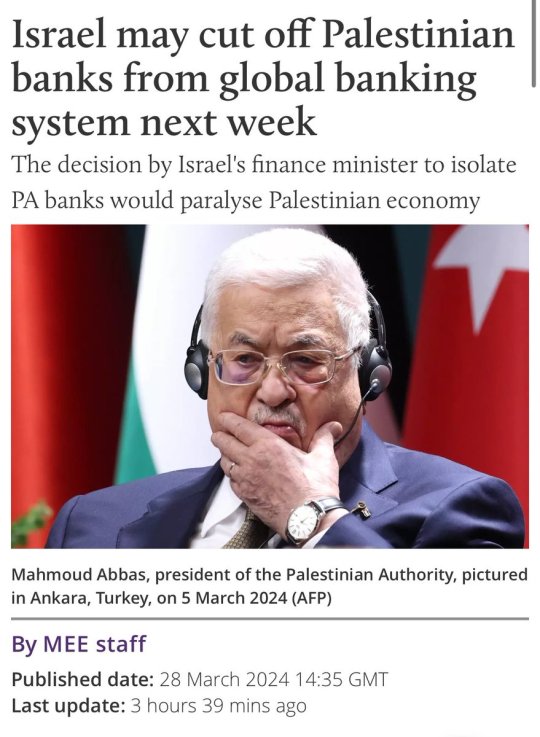
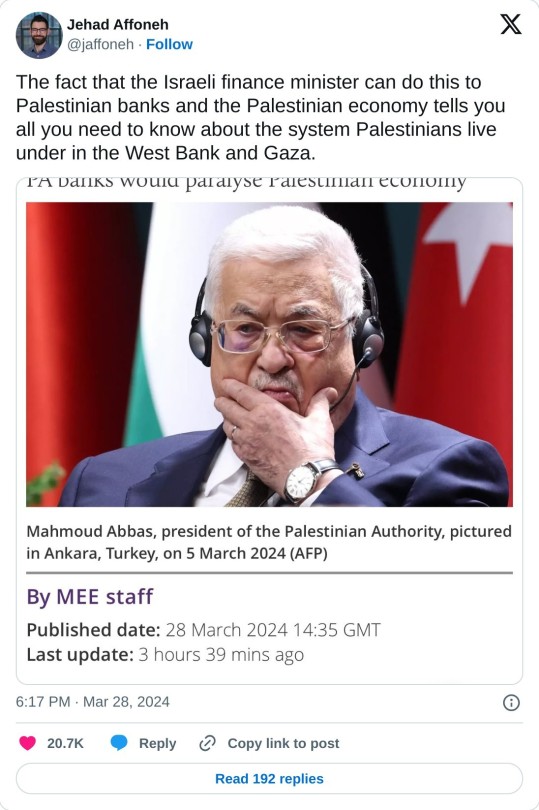
Palestinian banks could be cut off from the Israeli banking system starting next week following a decision by Israel’s finance minister to cease dealings between the two financial institutions, according to a report on Thursday by Israeli newspaper Haaretz. Israeli Prime Minister Benjamin Netanyahu has two days to convene a cabinet meeting to discuss reversing plans by Finance Minister Bezalel Smotrich to isolate Palestinian banks from both the Israeli and international banking systems. The Palestinian economy is based on the Israeli currency, the shekel, making it reliant on ties to Israel and its financial dealings with the rest of the world must go through the Bank of Israel and Israeli banks.
We call this Apartheid.
#yemen#jerusalem#tel aviv#current events#palestine#free palestine#gaza#free gaza#news on gaza#palestine news#news update#war news#war on gaza#apartheid#end the occupation#end the apartheid#economy
26K notes
·
View notes
Text
Silver: The Unsung Hero Of The New Economy
Silver demand continues to surge, driven by technologies like solar power and AI. In 2023 alone, the silver market experienced a 15% supply deficit. Furthermore, the market is expected to reach a cumulative deficit of 1,093.4 million ounces from 2020 to 2024. In this graphic by Outcrop Silver, Visual Capitalist’s Bruno Venditti discusses how new mines are necessary to meet the high demand for…
0 notes
Text
BIR expecting to collect billions from online sellers with withholding tax
With the 1% withholding tax on online sellers already in effect, Bureau of Internal Revenue (BIR) expects to collect billions of Pesos from the said sellers although they could not give an estimate on how much could be collected, according to a GMA Network news report. To put things in perspective, posted below is an excerpt from the GMA news report. Some parts in boldface… The Bureau of…
#Asia#Blog#blogger#blogging#Bureau of Internal Revenue (BIR)#business#business news#Carlo Carrasco#economics#economy#Economy of the Philippines#geek#GMA Network#GMA News#governance#government#journalism#new economy#news#online#online sellers#online selling#Philippines#Philippines blog#Pinoy#public service#Southeast Asia#Southies#tax#tax collection
0 notes
Text
Building the democratic local economy
Building the democratic local economy—reading Stir to Action’s ‘how to’ guide. New post at The Next Wave.
The magazine Stir to Action, and the project that sits behind it, has been one of the most effective popularisers in the UK of the idea of community economics and community wealth building. This is Stir’s ‘mission’ (though it doesn’t use this word): We work to create a more democratic economy in workplaces and communities, in particular through new infrastructure, business support, research and…
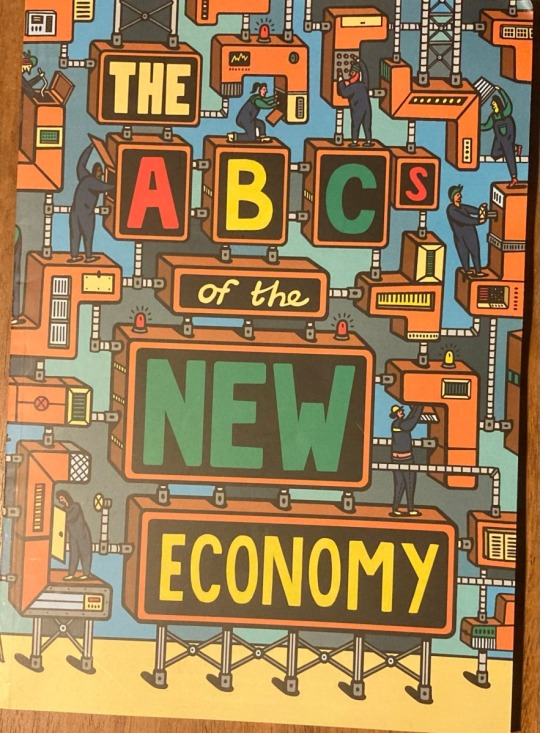
View On WordPress
1 note
·
View note
Text
Literally begging anyone who can vote in US elections to vote, and to vote against Trump. Which means voting for Harris, not abstaining or voting third party.
My family actually did move here from an authoritarian country, where voting literally didn't matter, they literally did throw out your vote, and they literally did assassinate citizens who spoke out against them.
We would all very much like to keep living in a country where those things are not the case!
You know, the same things that Trump and his stooges have openly said they want to do. And two of the main propaganda lines for why people in the US shouldn't vote, which is a lie.
Voting matters. The parties are not the same.
And make sure to vote in down-ballot races!!!
And like. The fact that voting matters in the US is a very real reason for hope. It is something you should genuinely appreciate. We can make a difference.
And a lot of people risked their lives or even died to earn that right, and it's a right not everyone has.
#interrupting our regularly scheduled programming for a voting matters psa#because I just saw like 5 posts encouraging people not to vote and those posts are bullshit!!!#us politics#election 2024#american politics#2024 election#uspol#voting#voting matters#the parties are not the same#voting rights#democrats#democratic party#united states#not news#yes I also really do wish voting third party had a chance of working#but it doesn't#yes biden's policy on palestine is atrocious and harris's is unlikely to be much better#but that doesn't change the fact that we DON'T live in an authoritarian dictatorship (yet)#and it doesn't change the fact that there is a massive difference between trump and harris#you will have a much harder time helping palestinians if trump wins and starts “crushing” pro-Palestine protests (direct quote from him)#and wrecks the economy so people can't afford to donate or to take the time to protest#me
4K notes
·
View notes
Text
https://popularresistance.org/digital-solidarity-in-the-sharing-economy/
DIGITAL SOLIDARITY IN THE SHARING ECONOMY
By Anna Moskal, Grassroots Economic Organizing.
December 5, 2023
Create!
Introduction
Digital solidarity and the sharing economy may seem like natural companions. To be sure, the sharing economy with its melding of community and commerce has the potential to be a key contributor to digital solidarity in developing economies. Both concepts revolve around the idea of collaboration, sharing resources and funds, community-building, the network effect, increasing trust between strangers, and the leveraging of digital technologies for the greater good. In this blog post, we consider how the sharing economy can contribute to digital solidarity in a developing economy; the barriers to the sharing economy doing so; and if unchecked how it can distort an economy. On that basis, we seek to propose a tentative legal policy for developing economies.
Digital Solidarity and the Sharing Economy
Digital solidarity is based on the idea of using technology and information technology to help people and communities around the world. It involves harnessing digital tools and resources to build community; leveraging technology to overcome economic, social, and political asymmetries; and assisting those who may have limited access to technology or face various forms of digital exclusion. Digital solidarity can manifest in many different forms including enhancing access to underutilised goods and services, increasing social inclusions, supporting vulnerable groups, as well as expanding education and skill development.
A potential contributor to digital solidarity is the sharing economy. The sharing economy is based on the concept of providing temporary access to underutilised assets and resources. It can include everything from free space, cars and objects to people’s time and skills. It is a socio-economic phenomenon that was originally presented as a path towards sustainable development (Heinrichs 2013), a marketplace that offers flexible and easily accessible jobs (Dunn, Munoz and Jarrahi 2023), and an innovative business model that can increase trust in society (Botsman and Rogers 2010). For example, in ride-sharing, the theory is that an otherwise idle seat is utilised and paid for when the driver is going in the same direction anyway. Especially in developed economies, it is a shift from ownership to sharing (Kathan, Matzler and Veider 2016).
Sharing economy platforms grew rapidly in the aftermath of the Global Financial Crisis (2007-2008) and the emergence of smartphones. Platforms started facilitating connections between those who seek resources (such as assets, knowledge, time and space) with those who are able to offer them. In developed countries, it has been an opportunity to switch from ‘asset-heavy’ ownership to paying for the use of goods and services instead. The sharing economy has been most closely associated with its popular and controversial poster children – Uber and Airbnb. Uber and Airbnb have facilitated transportation and accommodation, respectively, but have contributed to a ‘gig’ economy, a switch from employment to gigs, where job security is more precarious.
As is discussed below, some sharing economy platforms put social and environmental promises at the centre stage of their activity, while others are purely business-oriented and aim to maximise their profits. The sharing economy fuels economic growth and reduces the stress on the environment. Between these two extremes, there are a multitude of initiatives that attempt to integrate their socio-economic mission with generating profit. Many hold great promise for creating a supportive environment for digital solidarity among their users.
Even though sharing economy platforms take various legal forms, business strategies and objectives, there are common traits:
use of algorithms that efficiently match supply and demand, including doing so in real time;
dynamic review and feedback systems that, in particular, let us know that the person(s) we will be interacting with are probably safe;
in economic terms, platforms bridge the trust gap and have solved the lemons problem by providing information about the other party;
-leveraging the network effect; – reduced barriers to entry; – smooth transaction process and engagement of users.
Sharing is Caring Economy
Sometimes the emphasis in the sharing is on caring and community. That further illustrates how sharing economy platforms can help with digital solidarity. For illustrative purposes, we showcase three case studies where the sharing economy is indeed a caring economy. These include:
TimeBanks.org is a freely accessible online website that enables its members to earn time credits by fulfilling help requests from others, which they can then spend on the help they need. The spectrum of requests is wide and includes household tasks, computer assistance, transportation and picking up food, medical care, and yard work. For each hour of service of their choosing, members earn a one-time credit that they can use. This time bartering system is a unique way of building community through trust and solidarity between its members.
Nextdoor is an online neighbourhood network available in eleven countries, including the United States, the United Kingdom, the Netherlands, France, Germany, Italy, Spain, Australia, Denmark, Sweden, and Canada. It connects peers living in local communities and enables them to sell and buy products, exchange information on nearby events, publish posts on local crimes and complications, as well as provide recommendations. By doing so, it strengthens ties in local communities and increases trust between its members.
BeMyEyes is a free mobile app that aims to make the world more accessible to the visually impaired. It is now in over 150 countries by connecting them with sighted volunteers and companies from all over the world through a live video call. When Anna, a joint author of this post, was registered as a volunteer on BeMyEyes, she helped her callers by describing the colours of paints that they showed her in Ikea, distinguishing between purple and green socks (which look similar to some people with low-vision), and assisting in plugging in a three colour-coded RCA plug to the TV. Besides organising practical video calls, BeMyEyes offers an amazing community building blog section, where people share their personal stories, podcasts about blindness and useful tips and solutions.
These examples demonstrate that digital solidarity can indeed thrive within the sharing economy. Ostensibly a resource is being shared but it is really care and community that are shared. These initiatives have the potential to make a lasting impact on society and the way that we interact with one another in both the real and digital realms.
Sharing Economy in Developing Economies
For developing countries, the sharing economy can particularly help in the agriculture, human resources, and transportation sectors. It is an opportunity to access basic facilities that were previously unaffordable, as opposed to just activating underutilised resources. For example, in Africa, Hellotractor connects farmers who own tractors with those who need them and “there are numerous examples of mobile networks being used to communicate important information to [African] farmers, such as crop prices, pest issues and logistics […] Mobile platforms can be used to connect farmers or producer co-operatives with food storage and processing facilities, and this can help reduce food waste and maximise profits to farmers.”
The sharing economy provides scope for innovation and micro-entrepreneurship. For example, in the Philippines, Good Meal Hunting, brings together those who prepare and those who want home-cooked meals.
Barriers and Challenges
So far, we have discussed how the sharing economy can make a meaningful contribution to digital solidarity. Two further points need to be made.
First, both the sharing economy and digital solidarity are contingent upon having a digital infrastructure in place. Features of the digital structure include the internet, mobile payment systems, accessible technology platforms, as well as facilitating access to community or shop space and crowdfunding opportunities.
Second, the United Nations warns that an unchecked sharing economy in developing countries can concentrate power and distort the market; and lead to job insecurity and discrimination. Uber and Airbnb are large multinationals operating in cyberspace, often beyond the practical reach of local regulations with few obligations owed to service providers such as drivers. It may be that a business model based on commission is contingent upon increasing market share and therefore platforms have a natural tendency to become monopolies.
Regarding job insecurity, the concept of the sharing economy works best when the capacity is genuinely idle. An unused room in an Airbnb apartment is idle. Whether or not the room was rented out does not change the host’s activities. The same is true for an Uber driver accepting a passenger en route. In both cases, the payment is additional income without the host or driver doing anything different. When an Uber driver starts searching for passengers, the Uber driver becomes the equivalent of a taxi driver. The seat is no longer idle, and it is no longer a source of additional income. Uber driving is now work and an idle seat is downtime or lost income rather than being about monetising an idle seat. The opportunity cost of that work is another job. So, a full-time Uber driver is not truly part of the sharing economy. They are a gig worker who have lost the protections and benefits of full-time work. Concerns have been raised about the rise of ‘neo-feudalism’.
Conclusion
Hence, in developing economies, we argue that the sharing economy should be pro-poor, that is, it should seek to reduce poverty. The Institute For Sustainable Futures suggests that a pro-poor policy involves minimum wages for freelance workers, facilitating worker access to social security and training, promoting business standards for inclusiveness, and setting sustainability guidelines for businesses.
On that basis, we tentatively suggest that a legal policy for sharing economies in developing countries might be divided into three elements:
Enabling. Policy should support the acquisition of digital infrastructure at least in the initial stages. Since the digital infrastructure equates to power, ownership of platforms in particular should be thought through carefully. Pro-poor approaches could involve the development of platform cooperatives, and peer-to-peer sharing platforms. Laws should reflect this.
Promoting. Local laws should be facilitative of sharing economy activities. While this is out-of-scope and only initial thoughts can be expressed, the laws may involve ensuring there are joint ownership vehicles available and subsidising the acquisitions of assets for, say a platform cooperative.
Protecting. Likewise, competition laws should be pro-poor and guard against the risk of monopolies. They may restrict concentrations of ownership, require the adoption of pro-poor policies in the vehicle’s constitution, and provide for pro-poor personnel representation in management.
As noted by the United Nations, digital technologies have profoundly transformed society and our world is now more than ever relying on digital tools for connectivity and socioeconomic prosperity. We believe that the acts of digital solidarity can take many different forms and can be enhanced through the intermediation of sharing economy platforms. In light of the above, we hope that the sharing economy will not only be associated with its popular and controversial poster children – Uber and Airbnb – but also with a wide variety of platforms that help people and communities in developing economies by offering access to knowledge, information, skills and employment. By embracing both digital solidarity and the sharing economy, we can work towards a more connected, compassionate, and sustainable future.
0 notes
Text

2K notes
·
View notes
Text



#us politics#news#trump#democrats#republicans#politics#america#chima#economics#economy#pennsylvania#donald trump#capitalism#Us#maga
3K notes
·
View notes
Text
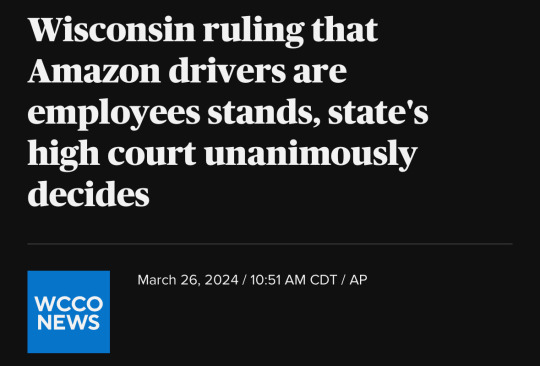


A win for gig workers.
This ruling may have a rippling effect across the country
#capitalism#good news#news#current events#government#politics#us politics#the left#progressive#activism#Amazon#workers#workers rights#gig economy
3K notes
·
View notes
Text
New Economy Solutions for Startups: Unlocking Growth in the Digital Era
The New Economy is transforming industries by fostering innovation, especially through startups. Companies in this space leverage advanced technologies, such as blockchain, AI, and the cloud, to offer dynamic solutions for modern challenges. These solutions focus on sustainability, digital transformation, and customer-centric products. By embracing features like agility, decentralization, and scalability, New Economy businesses are creating products that redefine growth and competition in today's rapidly evolving market.
0 notes
Text
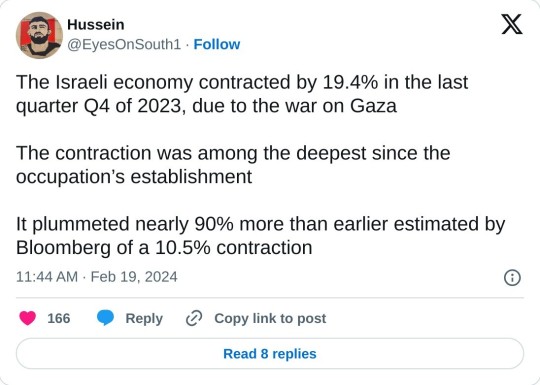
The economy in the fourth quarter was impacted by a 26.9% drop in private spending - the main growth driver - an 18.3% fall in exports and 67.8% slide in investment in fixed assets, especially in residential building. Government spending, mainly on war expenses and compensating businesses an
#yemen#jerusalem#tel aviv#current events#palestine#free palestine#gaza#free gaza#news on gaza#palestine news#news update#war news#war on gaza#bds movement#economy
8K notes
·
View notes
Text
THRIVE: Fundamentals for a new economy | Business Contact | (November 1, 2021)
Oct 26, 2021 Kees Klomp & Shinta Oosterwaal present their book THRIVE – fundamentals for a new economy. The steadily tangible catastrophes surrounding climate change and the collapse of biodiversity make it all the more clear that the current neoclassical economic paradigm – focused on the pursuit of continuous economic growth and the improvement of the standard of living – is pertinently…

View On WordPress
0 notes
Text
BIR admits taxing social media influencers is difficult
As far as the Bureau of Internal Revenue (BIR) is concerned, implementing taxes on social media influencers and collecting from them are still hard to do, according to a Philippine Star news report. To put things in perspective, posted below is an excerpt from the Philippine Star news report. Some parts in boldface… The Bureau of Internal Revenue (BIR) continues to have difficulty in making…

View On WordPress
#Asia#Blog#blogger#blogging#Bureau of Internal Revenue (BIR)#business#business news#Carlo Carrasco#digital economy#economics#economy#Economy of the Philippines#Facebook#geek#governance#government#influencers#journalism#new economy#news#Philippine economy#Philippine Star#Philippines#Philippines blog#public service#social media#Southeast Asia#tax#tax evaders#tax evasion
0 notes